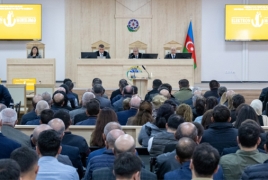
Armenia remains a target of aggression, yet the International Criminal Court (ICC) has not recognized its jurisdiction over this crime, according to Siranush Sahakyan, President of the International and Comparative Law Center and representative for Armenian captives at the European Court of Human Rights. She highlighted this during a panel discussion on "Hate Speech in Azerbaijan: Manifestations and Objectives of Armenophobia."
Sahakyan cautioned that Baku is leveraging testimonies from fabricated trials to level accusations against Armenia. She explained that these proceedings aim to demonstrate that Artsakh never existed as a viable, autonomous entity. Instead, they suggest that Armenia artificially established Artsakh's administration to "occupy Azerbaijani territories and exert control."
She emphasized the critical legal question of whether Artsakh's declaration of independence was based on the right to self-determination or constituted a violation of territorial integrity by a third state. This distinction influences international recognition of Artsakh's self-determination rights versus viewing Armenia as infringing on Azerbaijan's territorial integrity.
Sahakyan noted that, to date, Azerbaijan has not provided concrete evidence for its claims. However, these assertions persist in political discourse. She believes that Baku's current trials serve to construct arguments supporting these claims.
She questioned why certain leaders are compelled to state they received directives from Armenia and lacked autonomous decision-making. The intent is to portray all levels of decision-making as coordinated with Armenian authorities, suggesting that Armenia did not defend Artsakh's right to self-determination but rather "occupied" its territory through its administration. Such evidence is likely to be used in international proceedings.
For instance, Azerbaijan has filed a claim against Armenia in an international arbitration court. Through these testimonies, they aim to substantiate that Armenia engaged in economic activities in Artsakh. This is a significant concern, and Armenia must counter these false narratives.
Sahakyan pointed out that Armenia has not fully utilized all legal avenues. While Armenia ratified the Rome Statute of the ICC, it recognized the court's jurisdiction only over three crimes: crimes against humanity, war crimes, and genocide. However, the ICC also addresses the crime of aggression.
She stressed that Armenia, being a victim of Azerbaijani aggression, should sign and ratify additional amendments to recognize the ICC's jurisdiction over aggression. Failure to do so means that issues of aggressive warfare on Armenian territory are not under the ICC's purview. Given the incursions by Azerbaijani forces into Armenian sovereign territory since 2021 and ongoing threats, Armenia should enhance its defense mechanisms and seek to extend the ICC's jurisdiction to include aggression. She believes the reluctance to do so is primarily political.
In September 2023, following a nine-month blockade and the ethnic cleansing of the entire Armenian population in Artsakh, Azerbaijan detained former Artsakh Presidents Arkadi Ghukasyan, Bako Sahakyan, Arayik Harutyunyan, former State Minister Ruben Vardanyan, Foreign Minister Davit Babayan, and several other former leaders. The fabricated charges against them could result in life imprisonment. The sham trial of Artsakh's leaders commenced in Baku on January 17.

